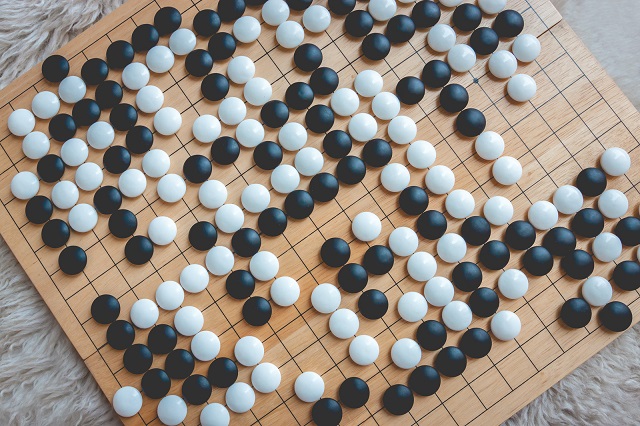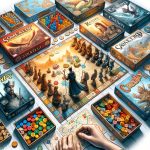
Strategy board games offer a fun and engaging way to develop problem-solving skills. These games involve a combination of luck, strategy, and competition to entertain players while allowing them to cultivate analytical thinking. While the rules of these games vary depending on the type of game being played, they all require some degree of planning and thought in order for players to succeed and win.
Storytelling elements come into play as well; strategy board games have characters with their own goals and objectives which must be navigated around using cunning tactics and clever moves. The tension that builds up as a result makes them exciting and unpredictable for both novice and expert players alike.
Mechanics – Understanding the Basics The mechanics behind strategy board games are usually quite simple but require strategic thinking from players. Players aim to strategically move their pieces on the board according to predefined rules while trying to outwit their opponents in order to achieve a goal or win the game outright.
Players also have to build a strong defense so that they can protect their pieces from being taken by an opponent while at the same time trying to attack ally pieces or capture those of their opposition. Furthermore, card based actions may be used in conjunction with regular playing pieces such as those found in chess; these are used to manipulate the game state in unique ways that help shape strategies according to each player’s objectives for victory.
Strategic Decisions – Making Focused Moves In addition, successful play requires actively focusing on making strategic decisions throughout each turn of a strategy board game’s progression. This could mean accurately analyzing various potential outcomes after every move; predicting what your opponent might do next; choosing highly opportunistic moves when favorable positions arise; deciding whether or not a given tactical line should be pursued further; or even building complex sets of plans for executing multiple steps during one turn cycle.
All successful strategists seek opportunities arising from these thin windows of opportunity presented by both randomly generated events along with player created situations (i.e., bluffing, baiting & trapping). As such, forming sophisticated plans that carefully dance around several mutually connected paths become necessary tools for long term success against skilled competitors is absolutely essential.
Different Types of Strategy Board Games & Their Rules
Strategy board games are an interesting way to spend time with family and friends. These types of games can keep a group entertained for hours, as players try to outwit each other and come up with the best moves. There are many different types of strategy board games available on the market today.
The most popular types are war-based games, such as Risk, Axis & Allies, and Stratego; worker placement games like Agricola; negotiating games like Diplomacy; cooperative play games like Pandemic; strategy puzzle games like Catan; and abstracts or classic board games such as Chess and Go. When playing these different board strategies, understanding the rules is vital.
Risk is a war game based on taking over territories by eliminating one’s opponents. Players take turns to roll dice in order to gain or maintain control of certain regions of the world map printed on the game board. The first player that manages to control the entire world wins.
Axis & Allies is another popular war game where two to five players control various countries throughout the Second World War. Victory is determined through strategic maneuvering across land, sea and air forces against enemy territories. A more advance version called Advanced Squad Leader adds even more complexity and intensive tactical combat scenarios for users who prefer a heavier strategy game.
Stratego puts two armies against each other in an effort to capture each other’s flag while defending their own base on two sides of a field made up of forty squares grid patterned playboard. Players get to choose from thirty-six different pieces which feature distinct strengths/weaknesses including bombs, scouts, marshals, miners and spies in order create clever combinations to attack and defend their territory from their opponent’s onslaught each turn.
Agricola also includes picking pieces but this game has a much less aggressive element than Risk or Stratego as players take turns harvesting crops while tending animals all within a limited amount of time without running out of resources in order be successful before winter ends and sun sets.
In any case, understanding the core concepts behind these type of strategy board games make them fun for all ages who want an entertaining mental challenge.
Benefits of Playing Strategy Board Games
Playing strategy board games is beneficial not only for the fun and competitive aspect they provide, but also for the mental and social gains it can offer. Although most people view video games as a way to relax, studies have proven that engaging in board games can help stimulate the brain. This is because they require strategy, focus, planning, and problem-solving skills – all of which will serve you even after the game has ended.
Mental Benefits
- Improves Concentration
- Increases Logical Thinking
- Enhances Memory Skills
- Learns Planning & Strategy Design
Strategy board games require players to plan out their moves carefully in order to win against their opponents. This requires intense concentration and decisive decision-making skills which in turn help to increase these areas of mental functioning. Also, due to the amount of critical analysis that are necessary throughout the game, logical thinking ability can also be improved continuously while playing these types of titles.
As an added bonus, memory skills are known to be enhanced significantly as players must remember events which they took part in during earlier rounds. Lastly, progressing through different levels requires a lot of planning and strategizing which can once again sharpen player’s minds over time as certain tactics become more refined on repeated use.
Social Benefits
- Gains Team Building Skills
- Encourages Cooperative Play
- Expresses Strategic Ideology Better
- Helps Learn Social Etiquette & Unspoken Rules
The need for collaboration and communication between opponents makes strategy board games perfect for honing social skills as well. Depending on certain rules followed by each title, interactions between participants may vary from moderate dialogues to loud outbursts of arguments about moves taken or discarded no matter how insignificant they may seem on the surface.
All this helps gamers not only be able to agree upon disagreements better but also highlight various strategies effectively in order to achieve victory quicker than others when required under current situations – all without ever having to resort towards physical aggression of any sort whatsoever making these genres especially suitable for younger children as well.
Additionally, gamers learn valuable life lessons such as patience while waiting for their turn or respecting everyone equally regardless of personal choices made inside or outside these gaming spheres leading up into the further development of key social characteristics within them over time.
Crafting Your Own Winning Strategy
Board games are a great way to spend time with friends and family, as well as challenge one’s mind. Strategy board games in particular have the added benefit of allowing players to hone their problem-solving skills and think ahead multiple turns. A good strategy can help make winning a game easier, but crafting a winning strategy requires practice and experience.
Forecasting Multiple Moves Ahead
The most successful strategy for any strategy board game involves players forecasting several turns in advance and mapping out the path they plan to take towards victory. This allows more experienced players to move in efficiently pre-planned moves toward collecting resources or gaining the upper hand in combat scenarios where applicable.
It is not always easy to perfect this skill, especially when a lot of randomness is built into the game mechanics such as probability-based dice rolls, which require more reactive strategizing than proactive foresight.
Exploiting Opponents Weaknesses
Another important aspect of strategic board game playing is taking note of how each opponent plays and applying that knowledge whenever possible. Different opponents may have weaker points at certain points in the game, so it’s important to exploit them whenever presented with an opportunity.
This kind of exploitation has an element of psychology attached to it; by taking control away from your opponents you gain leverage over them while simultaneously giving yourself access to resources or areas they would otherwise reach first.
Recognising Opportunity In Unexpected Circumstance
No matter how skilled you become at strategizing in these types of board games there will always be unexpected circumstances popping up throughout each match that no amount of pre-planning can prepare for. At these moments recognizing opportunity within chaos becomes paramount, as seizing upon this chance could present itself as being advantageous down the line – even if it seems suboptimal at first glance due its unexpected nature.
With sharp decision making optimising each turn may allow you to come out on top more frequently than randomly hoping luck will work out in your favour.
Optimizing Your Time
Board games can be a great way to pass the time during get-togethers or family gatherings. For those looking to raise the stakes a bit, strategic board games are also an option. These types of games usually require more concentration and longer play times than traditional board games – which can make them more exciting and enjoyable for experienced players who love to outwit their opponents.
Planning Ahead
The most important factor in finding a suitable strategy board game is determining your skill level and the level of difficulty you’re comfortable with. It may be best to start off with simpler games until you’ve built up your strategic skills and are ready for something more complex.
Researching various titles that have received critical acclaim, browsing lists of recommended beginner’s board games, or speaking with friends or family who play strategy games can all offer valuable insight into finding the right game for you. Many game reviewers will include descriptions about a board game’s suggested player age, estimated duration, and basic theme to help guide your decision-making process.
Different Types of Strategy Games
Once you have identified your comfort level with gaming strategies there are plenty of available options to explore. If you are looking for complexity then war-based strategy titles provide hours of tactical thinking as two players try maneuver their armies while taking resources such as territory or money from one another.
Alternatively smaller scale card based strategy games use hand management tools combined with special abilities, maneuvered around rolling dice outcomes to create even bigger challenges. Some turn-based titles rely on deckbuilding techniques where players compete through constructing powerful collections from limited resources, whereas other deckbuilders emphasize quick reflexes as simultaneous actions must be taken by multiple participants at once within short time frames – these can be highly exhilarating.
Choosing Your Opponent
It is important to remember that no matter what type of board game you choose the opposing player has just as big an influence on the overall outcome as anything else. Playing against an opponent that has years more experience than yourself might seem daunting so it is best to ensure that both parties involved have roughly equal footing when it comes to boards gaming ability.
Otherwise scouring online forums or checking at events designed specifically for potential gamers might be a way in finding opponents closer matched in skill level and knowledgebase who wish to take things at an appropriate pace within any given situation. Pitting two evenly matched minds against each other will always make for an interesting affair while adding diversity and new perspectives into any one given round.
The Need to Do Research on New Board Games
The world of board games is ever-changing. As new and innovative strategy board games come onto the market, players must be prepared to research and study the best ways to win each game.
This means actively seeking out resources, such as YouTube tutorials or online communities that can offer valuable advice on how to get ahead of your opponents in a given game. A good strategy board game should also require a great deal of thinking ahead – guessing what your opponents are likely to do in order to maximize your own chances of success.
The Benefits for Strategic Thinking
Playing strategic board games can offer several advantages. Evidence suggests that playing strategic-thinking type board games can improve problem-solving skills by encouraging players to consider various outcomes of particular moves they’ve made.
It helps people hone their decision-making skills, so when faced with similar dilemmas at work in the future, they are better equipped to make more informed decisions. On top of this, it can also help individuals foster relationships with those involved in the game, strengthen social connections and practice any relevant teamwork skills as well.
Playing With Others Or Solo
Whilst strategy board games are usually thought of as group activities played by multiple people, many don’t realise that such games can also provide an exciting solo challenge. Digital variations have enabled people from all over the world to play against each other on online platforms or against computer players who vary up the difficulty level in response to each turn taken by those playing solo mode.
For newcomers or newbie strategists looking to become experts there are numerous open source resources available which display different strategies within both group and non group settings within these style of games allowing for detailed analysis when approaching future battles either alone or in a team assault situation against fellow gamers worldwide.
Tips for Improving Your Playing Strength
We are often asked by players how they can improve their ability in playing strategy board games. There are many good practices that will help you to become successful, but here are some of the most important ones:
- Choose the game carefully – select a game with which you have some familiarity or a theme that interests you. The more familiar you are with something, the easier it is to begin to develop strategies and recognize patterns.
- Read the rules – knowing the rules of the game inside and out is essential if you want to be successful. As well as providing an outline of how to play, it can also provide an insight into strategic considerations for each action.
- Look at your opponent’s actions – Learn from your opponents when possible. In most cases, opponents will make moves that somehow benefit them; it may be beneficial for you to watch those moves closely and understand why they made them.
Winning strategy board games requires solid planning and problem-solving skills. Every situation presented will have multiple solutions to consider; thus training yourself on how to evaluate each solution against one another is very useful in order for making consistent decisions during proceedings.
Making these decisions quickly is also important as studies have shown that people who can think ahead faster tend to produce better results overall while playing through complicated scenarios. To practice this type of thinking, try solving puzzles or playing quiz type games which require collecting data quickly and making an educated decision afterward.
Developing your tactical skills by understanding what works best in any given scenario is key. Like chess and other strategy board games, having a set list of predetermined movesets may sound easy; however, having too much predictable behavior can lead opponents down the path of easily countering these strategies making them ineffective overall.
Conclusion
Being able to play strategy board games is an amazing way to engage with friends and family. In board games, there is no limit to the creative possibilities and imagination that one can explore. With the right game, strategy comes into play as different strategies will be created in order to win.
Strategy board games provide an opportunity for players to think critically and plan ahead. Throughout the game, players are presented with strategic decisions that they must weigh before making a move. It could mean the difference between winning or losing the game. Quality time spent playing these types of games together fosters relationships while stimulating critical thinking skills and keeping everyone entertained.
These games have something for everyone, regardless of age. If players wish to engage in more intense combat-style games such as Risk or Chess, this is a great option for adults while children may be interested in something more lighthearted like Checkers or Go Fish.
Not only are these games entertaining but they also help develop important social skills like fair play, collaboration and problem-solving which ultimately benefit all those who partake in any form of strategic gaming activity.
In conclusion, strategy board games can truly bring out the best in people as it gives them a chance to come up with unique solutions on their journey to reach ultimate triumphs over their opponents.
It’s an exciting way for members of a family or group of friends to bond in real life instead of just on virtual screens, which we know are a major part of modern life now days but should never replace the beauty found within organic human interaction.




